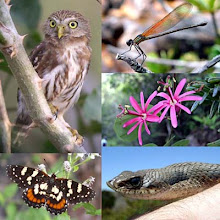The Sound Quiz I posted the day before yesterday is a Purple Finch.
This was given by an adult male Purple Finch, which had been perched next to the female, and both were giving call notes. The female flew to a tree about 20 meters away, and the male then began a series of soft call notes and subsongs. The subsong is often just a softened version of the long song, incorporating just a bit of mimicry, so I thought this one was unusual in being rather loud and having no Purple Finch sounds at all.
Twelve species were mentioned in the answers I received from my post to Oregon Birders On Line, and the top guess was Ruby-crowned Kinglet, which I found interesting. That species has a ridiculously complex song of very similar length and pitch, but it has only limited variety based on a set of three elements. Once you know those elements well, this song doesn’t sound like a Ruby-crown any more.
Observers who realized that mimicry was involved immediately thought of Lesser Goldfinch, which makes sense, as it is our most notorious mimic. Lesser Goldfinch incorporates many other species’ calls and song bits in its normal long song, and it does so many, so fast, your brain can’t quite keep up. Once you’ve recognized Violet-green Swallow and American Robin call notes and thought “wow”, it’s already gone on and mimicked five other species. But when it does this, the song is several seconds long and also incorporates many stereotypical Lesser Goldfinch sounds.
This quiz bird’s song is 100% mimicry though. This song differs from a mimicry-packed Lesser Goldfinch song in being only 2.5 seconds long and is not interspersed any goldfinch calls. It’s also a bit lower pitched than a typical Lesser Goldfinch song, and though it might be indistinguishable from the same song type given by a Cassin’s Finch, this was recorded in my Eugene backyard, where Cassin’s Finch doesn’t occur. Mimicry in House Finches seems to be rare or even undocumented.
The full recording starting with call notes, and unfiltered traffic noise can be heard here:
The one song phrase I used in the quiz is the last one at 2:30. Here’s a screen shot of the sonogram that I marked up using Preview.
I interpret there to be eight mimicked elements smashed together. The first is Northern Flicker, and the next two are both different call types of American Robin. The fourth I figured is the rattle call of Hairy Woodpecker. I had originally thought it was a close match for the fast rattle of White-headed Woodpecker, but I’ve since determined that that recording in my library is a mislabeled Hairy.
The next element is a rapid buzz, which I think might be Dark-eyed Junco or maybe Pine Siskin. Then there is one slurred note that is too fragmentary for me to place; and it might actually be a continuation of the previous element.
The next-to-last element is two notes that only when hearing them in complete isolation can you realize that they are Barn Swallow. Finally, the last element is a perfect Hutton’s Vireo.
To illustrate the last two, I created phony recordings by copying and pasting these same elements into a rhythm that might be heard in nature. When done this way, the mimicked species becomes more obvious.






No comments:
Post a Comment